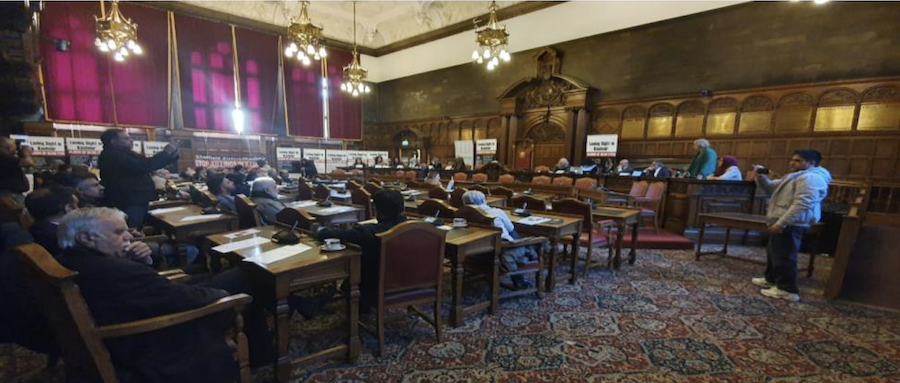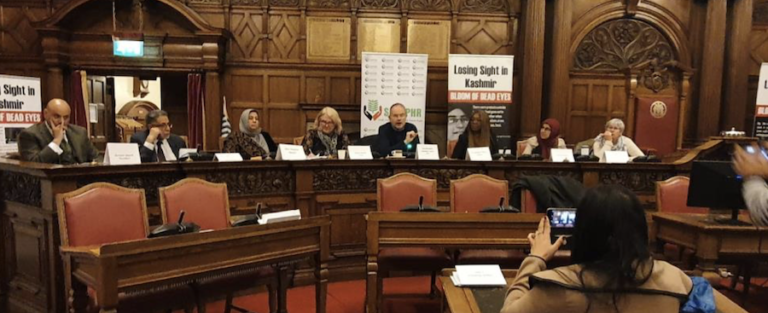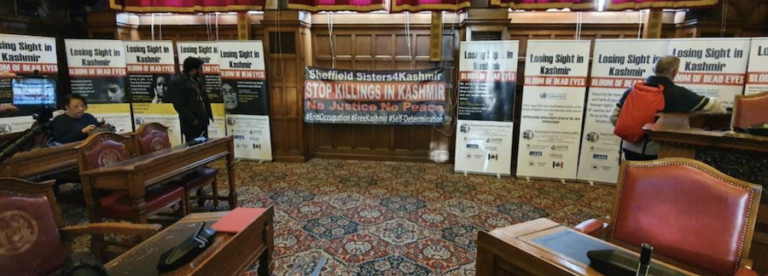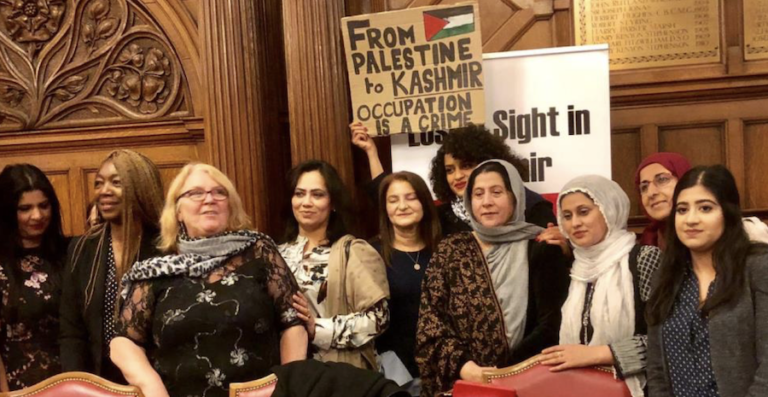
PRESS RELEASE
Sheffield, 1 December 2019: A women’s conference titled “Elimination of torture against women with special reference to Kashmir” was jointly organised by Kashmir Women’s Movement UK and Europe and Sheffield Sisters4Kashmir here in the Town Hall’s Council Chambers.
Political personalities like contesting parliamentary candidates, diaspora leadership, councillors, human rights activists, jurists, unionists and media participated.
On the side lines of the conference an exhibition titled “Losing Sight in Kashmir – Bloom of the Dead Eyes” was also organised by Organisation of Kashmir Coalition (OKC). A video enumerating the atrocities committed on Kashmiri women by the Indian occupying forces was also screened on the occasion.

There were two sessions of the conference. The first one was based on the various topics assigned to the speakers and the second session was an interactive session.
Those who deliberated included Zahira Naaz, Chair of Sheffield Sisters 4Kashmir, Nighat Basharat, Vice Chair of Sheffield Sisters4Kashmir, Mrs Shamim Shawl, Chair Kashmir Women’s Movement UK and Europe. Gill Furniss parliamentary candidate, Clive Betts parliamentary candidate, Paul Blomfield parliamentary candidate, Maxine Bowler trade unionist, Barrister Abdul Majid Tramboo, Professor Nazir Ahmed Shawl (both representing OKC) Dr. Madeliene Scherb, Dr. Nikhat iftikhar, Shahad Abdul Salam of Palestine Kashmir Society, Rana Shama Nazir and Tehsin Kousar.
Zahira Naaz, introduced the event and said that humanitarian crises always have a gender angle, particularly those involving armed conflict adding that trends analysis by the United Nations in 2018 shows that sexual violence is factored into the broader strategy of conflict, with women and girls being disproportionately affected and It has been no different in Kashmir’s disturbed history.


Nighat Hafiz took over from here and moderated the event.
Mrs Shamim Shawl apprised the participants about the challenges and consequences of the recent developments created by a Hindu fascist regime who have started a systematic process to change the demographic profile of the state by crippling the economy and facilitating the Indian population to come into state to convert the Muslim majority into a minority. She said that these developments on one hand cripple the economy and on the other generate fear for economic migration. She appreciated Sheffield women to be in the front line to create awareness about the challenges at hand in occupied Kashmir.
Rana Shama Nazir gave an overview of the dispute and explained its chronological evolution. She lamented that the promises with regard to self-determination remain unfulfilled.
Gill Furniss pleaded for an ethical foreign policy and promised the conference that she would stand with Kashmir. She also referred to the harrowing atrocities that she had viewed in a Kashmir documentary shown to her by a constituent. She also pleaded that British envoy in the United Nations should play effective role on behalf of the government as it was incumbent on the British government to play a pro-active role.
Barrister Abdul Majid Tramboo delved on the legal aspect of the dispute and he interjected international law to explain the Kashmiri freedom struggle awaiting to exercise their right of self-determination as promised in the UN resolutions under the international law and enshrined in UN Charter. He also emphasised that credible NGOs can raise the impending genocide going on in the locked down Kashmir at the International Criminal Court in Paris. He impressed upon the parliamentary candidates to do more and impact the policy making institutions with a more proactive approach.

Paul Bloomfield referred to the efforts that he has been making with reference to Kashmir. He referred to his engagement with the Foreign Secretary particularly on the continuing lock down of Kashmir expressing his dissatisfaction on the British government’s inaction.
Professor Nazir Ahmed Shawl after contextualising the need of a women’s day delved on the question of bilateralism. Prof Shawl declared emphatically that Kashmir struggle is for redeeming the right of self- determination. He asked the conference to understand the factual reality that a bilateral agreement cannot supersede an accepted international treaty arrived at a multilateral forum. He argued as under:
“India and Pakistan have bilaterally signed agreements and/or declarations Tashkent, Simla and Lahore. But to hold that any of these has overtaken the agreement they concluded under the auspices of security council is fallacious on four counts. First, it flies in the face of a recognised principle of international law which is stated in article 103 of the united Nations charter viz, obligations under the charter prevail over obligations under other international agreements. Second, the agreement secured by the United Nations deals specifically with the measures required to resolve the Kashmir problem while the other agreements are silent in that respect. Indeed as far as the Kashmir issue is concerned they do not rise above or fall below the level of duress while at the time the United Nations obtained the agreement which was repeatedly endorsed by the security council, neither party was driven to sign on the dotted line by defeat or any strategic disadvantage. Fourth, the people of Kashmir not being party to any bilateral undertakings between India and Pakistan can draw little satisfaction from them, they along with their supporters, see no reason why they should be bound by them. Of course they were not a party to the United Nations agreement either but that is not the same thing because the agreement left whole issue to their unfettered decision”
Clive Betts said Kashmir is a live issue that has human rights dimension. He reiterated his support to Kashmiris right of self-determination. He also referred to the unanimity of perception in his party over this subject.
Dr. Nikhat Iftikhar pleaded that the British foreign policy on Kashmir should not be elusive as it needs to respond to the existential relief and be a source of relief to the people of Kashmir.
Shahad Abdul Salam said that occupation is a crime from Palestine to Kashmir. She also discussed the similar practices of Israel and India. She said that Israeli apartheid is travelling to Kashmir. Shahad believe that both Kashmir and Palestine need international solidarity to restore human dignity in these occupied lands.
Maxine Bowler delivered the concluding remarks. She pleaded for making the women voices heard for raising the humanitarian concerns such as the sufferings of the locked down Kashmiris.
The message from the conference is loud and clear that we all need to pool efforts to bring about a qualitative transformation in the British Foreign Policy regarding the Kashmir dispute and that she shell of bilateralism has to open up for international facilitation.
The conferences emphasised that atrocities of a supremacist regressive and extreme right Indian government in Kashmir must come to an end and that the international solidarity should help Kashmiris to become masters of their destiny by choosing a political future of their choice.

